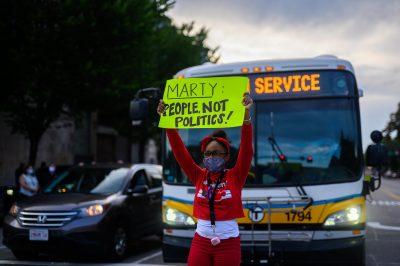Residents of Roxbury and the South End took to the streets Thursday to express their concerns about Methadone Mile, a stretch of Massachusetts Avenue popular for drug use and dealing.

Mayor Marty Walsh had closed the Long Island Bridge in 2014, cutting off access to an addiction recovery campus on the island.
Anyssa Buchanan, member of the South End-Roxbury Community Partnership, said it’s unfair the area has become unsafe for local residents.
“As a community, or as taxpayers, we shouldn’t feel like we need to walk on eggshells when we’re going for a walk in the neighborhood,” Buchanan said. “Our first instinct shouldn’t have to be looking around and making sure needles aren’t on the ground.”
Buchanan said the area is littered with needles, garbage and human feces.
The issues have spread from the stretch of Massachusetts Avenue to other areas of the South End, Roxbury and Fenway, Buchanan said.
When community members started sharing their experiences in a neighborhood Facebook group, Buchanan said, the Partnership was created as a forum to discuss their concerns.
“It became very apparent that both sides of Mass. Ave. were fighting the same issue,” Buchanan said, “just in parallel with one another.”
The Partnership has created a list of demands for the City and state.
In the short-term, the group requests Walsh and Gov. Charlie Baker treat the opioid crisis as a public health emergency, offer necessary services to unhoused and addicted populations and provide sanitation services to keep neighborhoods clean.
Their long-term demands include increasing local police patrol funding, as well as rebuilding the Long Island Bridge and reopening its recovery center. The Partnership also hopes to convert Shattuck Hospital in Jamaica Plain into an emergency recovery center.
Around 6 p.m. Thursday, crowds began to gather at the corner of Massachusetts Avenue and Washington Street.
“Where is Marty?” protesters chanted as they stood on all four corners of the intersection, raising signs. “Open the bridge.”
Some protesters clashed over whether they should march down Massachusetts Avenue, but the group ultimately remained stationary. Others disagreed about how to solve the problems in the area.
Cassie Hurd, an advocate with Safe Injection Facilities Massachusetts who attended the protest, said those using drugs in the area need services sooner than when recovery campus construction on Long Island would be completed.
“It feels somewhat like exiling people off to an island, which doesn’t feel good,” Hurd said. “People still need services: access to detox, recovery, harm reduction and shelter.”
Other protesters came to voice their support for harm reduction programs like needle exchanges and safe consumption sites.
Some protesters moved into the street and blocked cars from crossing the intersection. Police cruisers began restricting traffic from the area before 7 p.m.
Attendees began sharing their experiences to the crowd around the same time. One speaker spoke about her son, Damien Hughes, who was killed in the area.
“My son was killed at 7:30 a.m. on video by a man who needed mental health services himself,” the woman said. “My son was number 34. How many more, Mr. Mayor?”
Several protesters said they were worried about their family’s safety. Makeda Payton, 39, of the South End said the City hasn’t addressed her concerns.
“At least three times a week I come outside with my four-year-old child to see somebody shooting up on our front stairs,” Payton said. “There’s nothing being done about it by the City.”
Protester Matt Peterson, a resident of the South End, said he wants to see recovery services moved to other areas.
“Why is this neighborhood dealing with everyone? The rest of the city isn’t and the rest of the state isn’t,” Peterson said. “We didn’t cause the opioid crisis … Why should we have to bear all the burden?”
Walsh announced in January 2018 that Long Island Bridge would be rebuilt. However, work has been stalled ever since the Quincy Conservation Commission denied the City’s replacement proposal in September of that year.
A series of lawsuits in the state’s court system remains ongoing as Boston challenges the City of Quincy.
Allison McBride, associate director projects and strategic planning at Northeastern’s Health in Justice Action Lab, said it’s been challenging for those in recovery to find shelter since the bridge closed.
“The problem is that there’s just a lack of beds in Boston, so it’s a bottleneck effect,” McBride said. “People just get stuck and they can’t find a bed.”
She said medical care providers must change their mindset about treating addiction.
“It’s all about, ‘let’s get you off of a substance right now,” Mcbride said, “rather than, ‘let’s try to address the fact that you don’t have a house, let’s try to address the fact that you are trying to work through this trauma that you’ve had from using and seeing people die around you.’”






















































































































